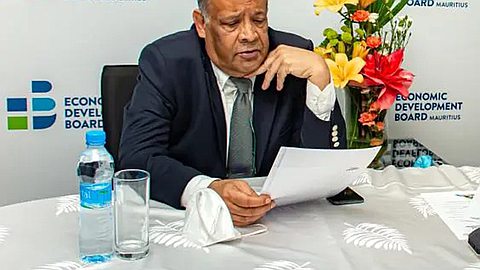Treaty with India: Mauritius Organizes Resistance
"It's a bit strange, is not it, a small jurisdiction such as ours is the major target of attack of the place?" asks Nikhil Treebohun, the Chief Executive Offi cer of GIIF, organization of a non-profit organization representing and promoting the interests of the financial services sector, in an interview yesterday afternoon. He added: "Maurice does not fall into the category of tax havens. We are not on the blacklist of the OECD (Editor's note: the Organization for Economic Cooperation and Development). But some continue to use those intimidation tactics as the industry is very competitive. "
These comments come at an opportune time. In one week, Mauritian and Indian technicians will meet around a table, on our territory, to discuss the Treaty of double taxation, which dates from 1982. This high-level meeting, where the Mauritian delegation will be headed by Foreign Minister, was addressed to and fro in the Indian press, the articles are too often accompanied by about unfavorable.
India accuses Maurice round tripping, allowing Indian entities to transfer money to the country and then invest again in India, taking advantage of tax benefits of the treaty. Great Peninsula We also criticizes the lack of information sharing and believes that we are an offshore tax haven. But Maurice said to have the whole arsenal to counter these attacks.
Mauritius is the largest source of foreign direct investment in the Great Peninsula, which surprised many."Mauritius is perhaps to India what Hong Kong is to China," says NikhilTreebohun. It is clear that this treaty as criticism has been idle for a decade. He was particularly favorable to Indian companies operating in Mauritius, such as Baroda and Air India, Indian as well as insurers and expatriates based here. Moreover, foreign multinationals were skeptical about its effectiveness.
The trigger occurs in 1993. India opens its market to foreign institutional investors. Meanwhile, Maurice began a campaign to promote its offshore sector. And since then, Maurice has found and has positioned itself as a jurisdiction of choice to enter India and invest in financial markets.
"The financial services industry is the third pillar of the Mauritian economy. Its turnover has increased fivefold over the past five years to more than Rs 4 billion, " emphasizes our interlocutor. "accounting for 12% of GDP, employs 15 000 highly skilled people and contributes 25% of direct taxes. "
Is this whole industry will be destroyed with one stroke of pen? The end result can only be positive because Maurice guarantees both, especially as verified by international bodies such as the OECD. "The end result should be the strengthening of our financial sector and its transformation into a financial center International, which can also be used to channel the Indian investment to other regions, particularly in Africa, " explains the CEO Forum.
And the Indians have no interest in change everything overnight. On the one hand, discussions of the working group operating in a specific context, which is to ensure that there are safeguards to prevent abuse of the treaty, and this without prejudice to the interests of economic country. And the other, any amendment will brutal impact on the Mumbai Stock Exchange. On June 20, the Bombay Stock Exchange Sensitive Index, or Sensex, fell 3.1% after the tax department has indicated its intention to tax gains on investments through India.




